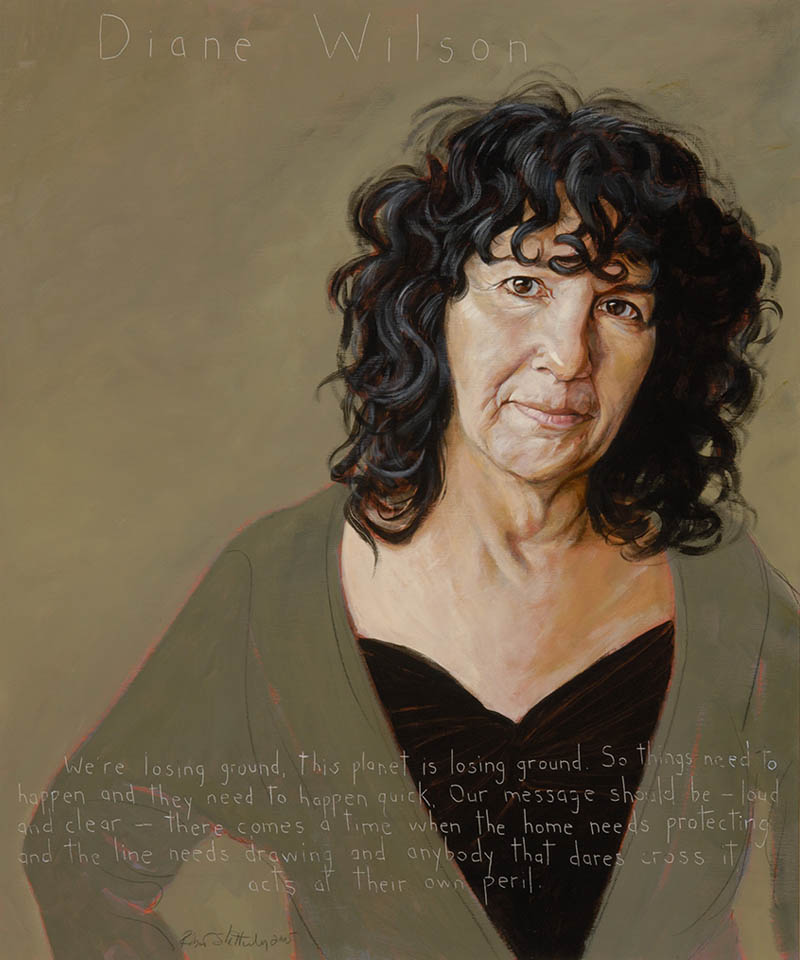
Diane Wilson
Shrimper, Environmentalist : b. 1948
“We’re losing ground. This planet is losing ground. So things need to happen and they need to happen quick. Our message should be—loud and clear—there comes a time when the home needs protecting and the line needs drawing and anybody that dares cross it acts at their own peril.”
Biography
When she called a meeting in 1989 to discuss how a plastics manufacturing plant might affect the environment in her coastal Texas county, fourth-generation shrimper Diane Wilson had no idea how her life would change. She just wanted to have an honest discussion about things people who lived in Calhoun County would care about: the impact of a Formosa Plastics expansion on the health of the people who lived there and on the livelihood of those who fished the bay.
Wilson couldn’t have known that her dog would be shot in her yard, that she would become a pariah in her own community, and that someone would attempt to sink her boat—with her on it. With just a high-school diploma and a dislike of chemistry, she couldn’t have known that she would become conversant in chemical compounds and their health risks, file her own legal briefs, and learn more about the corruption of public officials than anyone would want to believe. She couldn’t have imagined that she was setting out on a new life path that would fortify her sense of purpose and draw international networks of support. Wilson wrote in her 2005 book, An Unreasonable Woman, “Risking one’s life can be strangely liberating.”
The expansion of the plastics plant got the green light despite Wilson’s campaign. But after a lot more work and four hunger strikes, she persuaded Formosa Plastics to sign a zero-discharge agreement—and then got neighboring Alcoa to sign one, too. After visiting India, she came home and went after Dow Chemical, which had bought Union Carbide after its massively lethal, Bhopal chemical spill in 1984. Wilson pressed the company to make fair reparations to the affected families in Bhopal, India.
When Wilson told her story at the 2001 Bioneers Conference of environmental activists and scientists, she challenged listeners to become “unreasonable” in their defense of the Earth. A new group, Unreasonable Women for the Earth, immediately formed, and Wilson says that members in eight countries supported her hunger strike against Dow. With Medea Benjamin, Wilson co-founded another network of women activists, Code Pink: Women for Peace, in 2002.
In December 2005, Wilson began serving a four-month jail sentence for civil criminal trespass – chaining herself to a Dow Chemical tower in August 2002. The jail term opened a new chapter in her activism, as she advocated for better conditions for other women imprisoned in Texas’s Victoria County jail.
Wilson joined as a plaintiff in the case San Antonio Bay Estuarine Waterkeeper v. Formosa Plastic Corp., brought against Formosa Plastics for violations of the Clean Water Act, polluting the Texas coast. Along with other volunteers, she collected millions of nurdles (preproduction plastic pellets) to be used as evidence. The suit was settled in October 2019, requiring Formosa to pay fifty million dollars for environmental cleanup and remediation.
Since An Unreasonable Woman, Wilson has written two more memoirs: Holy Roller: Growing Up in the Church of Knock Down, Drag Out; or, How I Quit Loving a Blue-Eyed Jesus (2008) and Diary of an Eco-Outlaw: An Unreasonable Woman Breaks the Law for Mother Earth (2011).
In April 2023, Wilson received the coveted Goldman Environmental Prize for North America. Upon her receipt of this honor, The Goldman Foundation created this short video about her work. View her acceptance speech here.
Related News
Programs
Americans Who Tell the Truth (AWTT) offers a variety of ways to engage with its portraits and portrait subjects. Host an exhibit, use our free lesson plans and educational programs, or engage with a member of the AWTT team or portrait subjects.

Education
AWTT has educational materials and lesson plans that ask students to grapple with truth, justice, and freedom.

Exhibits & Community Engagement
AWTT encourages community engagement programs and exhibits accompanied by public events that stimulate dialogue around citizenship, education, and activism.